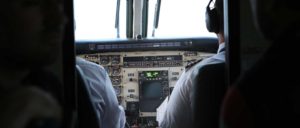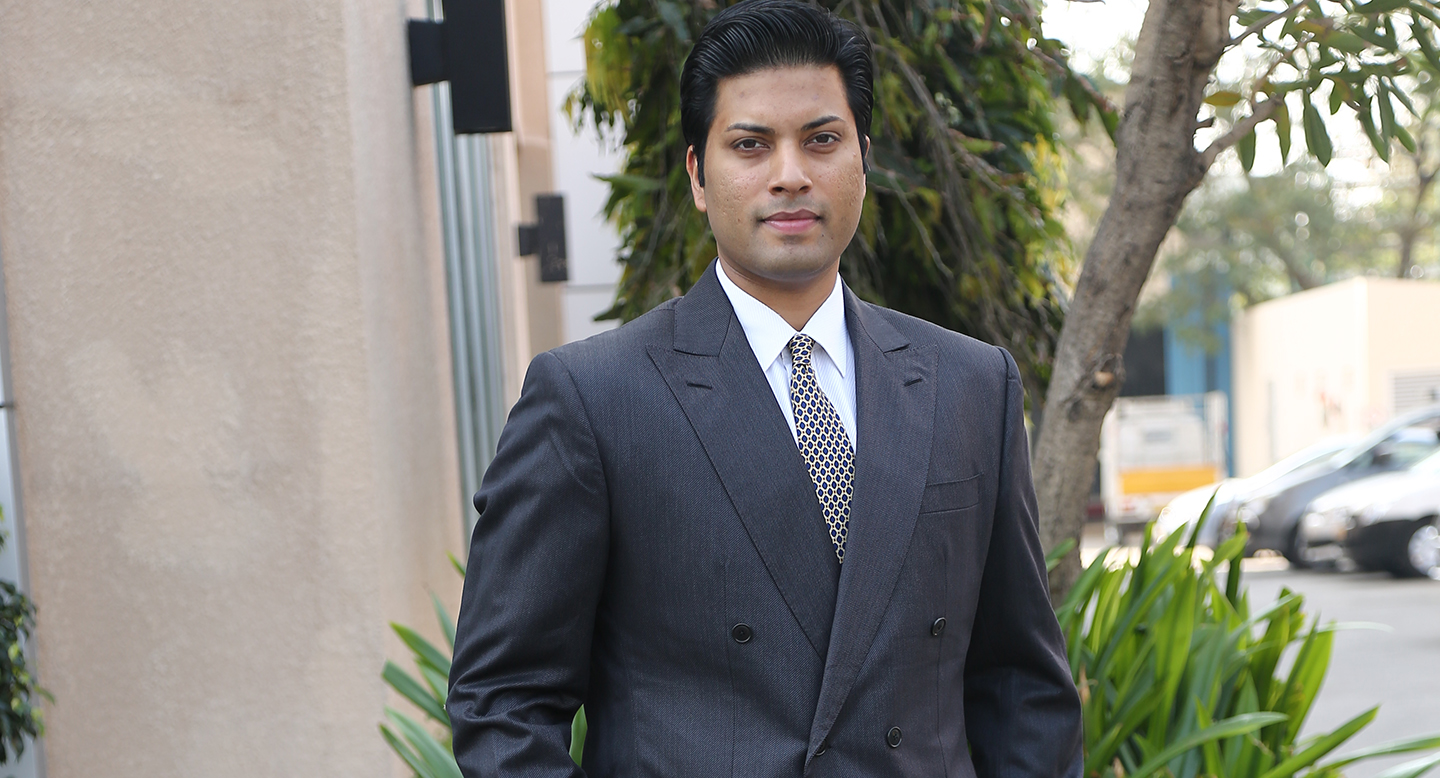The AirAsia India boss discusses his interview experience with Tony Fernandes, his firm-and-fair management style and why it is crucial to be a serial innovator to win in the aviation business.

His appointment as CEO was announced on Twitter with inimitable style. A father to three young boys, this 33-year-old management consultant had never worked in India or for that matter, had no hands-on experience in the aviation business. As an MBA from INSEAD, one of the youngest general managers at Ingersoll Rand and then, head of Egon Zehnder’s Asia Pacific practice, he had picked up a variety of management and operational skills including conducting assessments of senior board members as part of his job at Egon Zehnder.
Mittu Chandilya, CEO, AirAsia India, has had a enriching career, one filled with several milestones at a very young age. Tony Fernandes, founder-CEO, AirAsia, placed his bets on Chandilya to lead the company’s India operations. Since joining AirAsia India, nine months ago, Chandilya has quickly stepped out of Fernandes’ shadow and built an image of his own.
We decided to get Chandilya to answer the inaugural edition of The Smart CEO Questionnaire, a well-thought out set of questions that aim to help us understand the personality behind a CEO. How else would we know that he is a firm yet fair boss who would not hesitate to fire a non-performer yet show enough compassion to help him or her find another job?
Let’s begin playing 20 questions with the world’s youngest aviation CEO.
Your first stint as CEO is a high-profile one. What excites you? What scares you?
What excites me is actually very easy to answer. Look, as everyone says, aviation is an industry fraught with myriad issues. The way I see it, it is intellectually stimulating to find opportunities in such an adverse industry. Just going to work, every single day, upping our expectations and knowing that we have the ability to be a pioneer is exciting. It is almost like we are playing a game of chess; one needs to be three steps ahead of the competition and the regulators.
“I believe the industry will be in a fabulous place and there will be a lot more players from outside. With an airline like ours coming in, you’ll see the fares coming down. I always compare this industry with how the internet was 10 years back.” – On the future of indian aviation
![]()
On the other hand, I am worried about not living up to the expectations of our collective goals – the goals of all our employees, our investors and our key stakeholders. In any organisation, it is the role of the CEO to ensure the collective goals of everyone comes to life.
Tell us what you did on Day 1 as CEO?
I still remember the day very well. I was in Kuala Lumpur, meeting several people from various teams at the AirAsia headquarters. I met senior heads from every department, learning about each briefly and just having a chat. I think I met about 500 people that day and it would be a good quiz to remember those names.
Then, Tony (Fernandes) and I sat down to go through the plans we had for India. I was already doing that before I started but that day was really the start of planning our recruitment and organisational ramp up. It was extremely exciting and I wish that day had gone on longer.
Take us through a conversation you have had with Mr. Ramadorai, chairman, AirAsia India that has influenced you a fair bit.
I chat with Ram almost every day and the aspect that strikes you every single time is that he is very, very humble. That humility shows in all our conversations and it also means that for him, it is about simplifying things. I talk to him about building relationships, about tactical to-do lists and even go to him to learn about a particular regulatory body.
What do you think makes the entrepreneurial partnership between you and Tony work? In what ways are you similar? In what ways are you different?
I think we are very similar in terms of our dreams and ambitions on how far we can take this organisation. Every time we talk, we are upping each other. I am pretty aggressive about the goals I set for myself, even with him and every single time, I over commit and still deliver. I hardly go to him for extra budgets; I am always thinking – How can I make this money go even further? How do we become more impactful with lesser resources? It is always about how we keep costs down, quality high and safety high. How do we take care of our people well? How do we generate more revenue? So, both of us are asking the same set of questions and there, we are alike.
In terms of how we are different – Tony, of course, has a lot more experience and knowledge. It is a strong positive for me and I constantly learn from him.
Share with us 10 things that are different about AirAsia when compared to other organisations.
In comparison to AirAsia-the Group, we are very similar. First, there is no hierarchy. Everyone is treated with respect, no one should be belittled and all of that. If someone wants to have a chat with Tony or the board members, it is usually pretty easy. We are extremely transparent and direct in our internal communication. There is no need for anyone to send out an email just to cover up his or her mistake. People are encouraged to be direct and keep moving.
“To put it very simply, it is because we let these metal things fly over people’s heads! That is the fundamental reason why a lot of regulation is needed. The other two aspects that make it even more complex are that these metal things are extremely expensive and they run on fossil fuel.” – On the regulatory challenges in this sector
![]()
The aspect that makes working at AirAsia very exciting to a lot of people is that we truly believe everything is possible. It is a unique and powerful trait to have. We are dynamic and execute really fast. We could rip apart a strategy at the very last minute and quickly come up with something else.
We are not afraid of being politically incorrect. Of course, we don’t like to step into controversies, but we don’t mind if we get pulled into something. Taking risks is encouraged and people with potential are always given an opportunity.
People are often thrown into deep ends and they tend to perform without extensive training. It is usually about quick learning on the job. The most important aspect of our organisation is that there is a genuine buy-in from all our people for our overall goals. People join us because they know this is where they want to be.
In addition to your business skills, you did some modeling and won a corporate car rally. Your CFO acted in Tamil films. Does AirAsia look for people with varied interests and skills?
It is not something we go looking for, but we certainly like diversity in thought. Our whole company was built based on that principle. Tony came from the music industry and built this up. Having said that, we have very experienced people in flight operations and other aviation-specific functions.
Overall, we look for very ambitious people with a lot of hunger. The culture of the organisation is very important for us. In certain functions, I am okay with B-players as long as it makes sense from a team perspective. It is the results that matter.
Take me through one of the hiring interviews you did?
I actually ask people all kinds of questions. I ask them – what car do you drive? What was the last book you read? What watch do you wear? Typically, candidates come well prepared for interviews. You ask them about their top three accomplishments in a previous job or how they mobilised a team for a project, you get prepared answers. In my interviews, I am fairly non-traditional.
I sometimes even ask candidates if they have lied? Can I trust them? These questions help us understand a lot about the person we are interviewing and also their ability to hold an interesting conversation. The other thing I always do after the interview is to give feedback. If I feel a person was not up to the mark, I usually explain what areas he or she should work on. I believe people value feedback. Even if they forget the interview, or me, they always remember the feedback.
Of course, in addition to my interview, the functional leads conduct fairly in-depth technical interviews.
Take me through your own interview with Tony.
It was a very direct, focused interview. He asked me a whole lot of technical questions – how I achieved some stuff, things I had worked on in the past. I started the interview giving him a background about my personal stuff. Overall, he was impressed with my experience at a relatively young age.
As we progressed in the interview, we morphed into what my role would be if I got the job. We spoke about my ambitions, his ambitions and that is where we really connected. Then, I think, he tested how competitive I was. He said, ‘I don’t think you can do it.’ I guess he just wanted to see how I reacted. And that’s when I shared my ideas for AirAsia India with him and I guess, that sealed the deal.

We also spoke a lot about people and what values in people I admire. I also think he wanted to make sure I wasn’t a yes man, but someone who would make my own decisions.
How would describe your management style?
Look, I am firm and I am fair. I am not very patient, yet I believe I am compassionate. If I have to let someone go, I am firm about my decision yet I worry about his family and maybe, even help with finding a job. But, as an organisation, we are very focused on results and do not tolerate lack of performance.
You worked at Egon Zehnder where, I believe, you had a chance to observe and interact with people from a variety of industries. Is there a story from your earlier avatar that is etched in your mind?
At Egon, I was a part of 90-odd searches for senior executives. Each search involved 5-10 interviews followed by a few more deep-dive conversations. The major learning from this stint was in the area of psychometrics. It is not really the psychometric tool itself; rather it is the ability to internalise it and spot talent.
I have been a part of board assessments and have had to tell senior board members that they are not doing a good job. At a very young age, it is not easy to go say that to a senior board member with a whole lot of experience.
Also, one the best lessons from my consulting days, is to suspend the agenda and build genuine relationships. Sometimes, in the world of management consulting, you always look for the opportunity to sell. But when you suspend your agenda, listen well and then come back later with a proposal on how you can help in the given situation, people appreciate it. I guess the ability to build intimacy with clients and win their trust, not through gimmicks but genuinely, is crucial.
What did you learn at business school that turned out to be useful?
(Laughs.) Well, business school was a lot of fun. I went to INSEAD and like people often say, the biggest learning was from my peers. I was fortunate to have had an eclectic group of classmates – entrepreneurs, diplomats and sons of presidents – and you learn a whole lot from them.
I come from a family of entrepreneurs and I would say being one is actually a mindset. You take full ownership of something and don’t think of backing off. You don’t think about what goes wrong. I think, INSEAD formalised some of those thoughts for me and brought it down to a science.
Are we at a time in the history of business management where the fundamentals of managing a business have changed? For example: people are as much focused on social impact; design thinking is becoming a mainstream; companies are willing to collaborate more with each other.
Absolutely. You mentioned some valid points but it is really a combination of different things. In today’s world, one needs to be a serial innovator, especially in terms of process. Now, this mindset has to be internalised by everyone in the organisation. If you want an organisation to be socially responsible, real impact happens when people are genuinely compassionate and want to give back.
I would also say the method of managing people is going through a major overhaul. You need to empower people, give them the opportunity to speak up. The days of command and control are over. Respect for everyone is extremely important.
It is not about the 5-year plan; it is about what you are doing, every single week. You need to be a sprinter in a marathon. Every 100 metres, you need to check your performance. I also think managers need to have this characteristic called energetic patience. One needs to be patient about results and know that at the last minute, things can change.
At AirAsia India, we tweak our plans every week. How many planes do we bring in? What about forex? Which routes do we launch? Nothing is permanent and the agility to change is crucial.
Finally, I would say, leaders have to make sure they don’t get burnt out. They need something beyond the workplace that keeps them going. For me, it is my sons.
“At AirAsia India, we tweak our plans every single week. How many planes do we bring in? What about forex? Which routes do we launch? Nothing is permanent and the agility to change is crucial.” – On why every company needs to be extremely nimble in today’s world.
![]()
Take me through your experience of working with the government, something you have not done in the past.
I love it. I don’t know why people say it is difficult, for me it is intellectually stimulating. My take is, when you are working with the government, lead with ethics. Once you deal the whole thing with clarity, there is no problem.
The other thing I do is to prepare for every meeting carefully. I try to understand the big issues on the other person’s mind. I execute quickly on the action items from these meetings; it is important to be persistent.
Once you became CEO, what is one marked difference you see in yourself?
The biggest difference is I don’t have much time these days. I used to be a lot more disciplined about work-life balance. I work out a fair bit and that is my biggest getaway from work these days. I am usually taking a step back and am thinking alone when I am on a plane or working out.
What makes it all worthwhile is the quality of work and my immediate team, which comprises a lot of fun people
What does leadership mean to you?
It is about making the tough calls, when nobody else is willing to make them. It is also about setting the conscience of the company and making sure the collective goals are met.
Also, personally for me, creating social impact not only for our own stakeholders but also for the state we operate in, is important.
Gut vs. Data. When you are in a dilemma, which do you lean towards?
Gut. (Pause.) At least 90-percent of the time. As a leader, you, of course gather a lot of data and analyse it carefully. But at the end of the day, you got to make those bold decisions, stand by them and take corrective action if needed.
From a decision-making perspective, I do have a lot of team meetings, but the final decision is mine and I am authoritative about it.
If you ever write a book, what would it be about?
(Laughs again) I am thinking about it. The unique experience that I have had over the years is that I was youngest at everything. I have always done things, which went against mainstream thinking. It will be good to share these life experiences, especially with college students. I also like to make fun of myself, so maybe it will be a combination of the two. Let’s see.

Take me through some of your observations from the global aviation industry. It is, fundamentally, a crucial industry for the world to operate seamlessly in, yet a very difficult business to run. Why?
It goes without saying. To put it very simply, it is because we let these metal things fly over people’s heads! That is the fundamental reason why a lot of regulation is needed. The other aspects that make it even more complex is that these metal things are extremely expensive and they run on fossil fuel. Also, it is not easy to find talent in some of the technical roles, say, captains. These are the primary factors that make the aviation industry fairly complex.
What has made AirAsia successful globally is that we challenged some of the fundamental processes. We run the company as if it a non-high asset company. While there are specific teams that manage the high-cost assets, the rest of the company moves very fast. It is this agility, in tandem with a deep focus on revenue and costs that makes us successful. I would say these lessons from AirAsia’s global operations also let the Tata board and AirAsia senior management believe that I could lead the operations here. It is the company’s ability to back the people it believes in.
Process is key to the aviation sector, especially to control costs. However, it is the cabin crew that brings the flying experience alive. Do you agree? What is your theory on process vs. on-the-spot flexibility?
In the 12 years of AirAsia’s existence (the overall Group), two of the things we will never mess around with are safety and security. You can get creative with your safety briefings, but it is extremely important to get the message across. But beyond that, the cabin crew is allowed some flexibility to bring in any differentiation. As for the pilot, there is a clear list of things he or she can or can’t do.
Are you excited about the future of Indian aviation? Where do you see it 10 years from now?
I believe the industry will be in a fabulous place and there will be many more players from outside. With an airline like ours coming in, you will see the fares coming down. I always compare this industry to how the Internet was 10 years back. Planes will be a mode of transport that is accessible and affordable to all. Travel, like the Internet, is crucial for everything that people do, including productivity and I believe a few good airlines will shape up the overall industry. It won’t be a monopoly or duopoly for sure.
10 UNIQUE ORGANISATIONAL TRAITS OF AIRASIA, GLOBALLY
1. No hierarchy, seriously.
2. People push each other to be transparent and direct. No “covering up your mistake” emails allowed
3. The company truly believes everything is possible
4. People are encouraged to execute fast, really fast. Strategies can change last minute, but deadlines won’t.
5. Not afraid to be politically incorrect
6. Potential always given a priority over experience
7. People thrown into the deep-end, then expected to win the race
8. Risk taking is encouraged
9. People often come looking for a job at the company, hearing about its culture
10. Teams work together towards a common goal and are genuinely passionate about it
